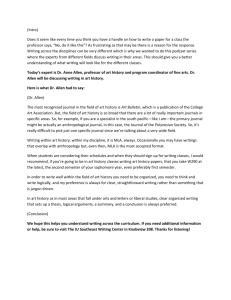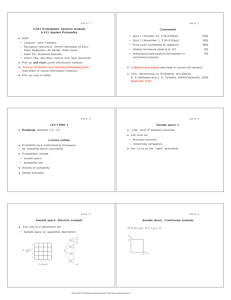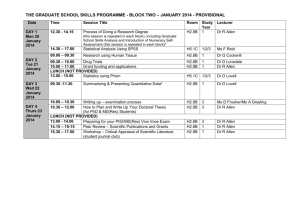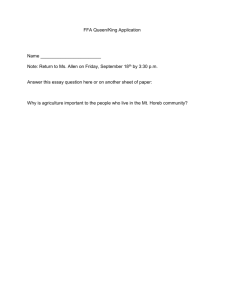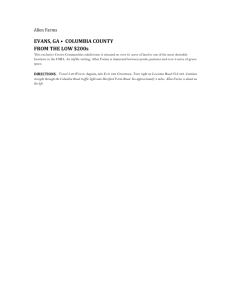Document 13554842
advertisement
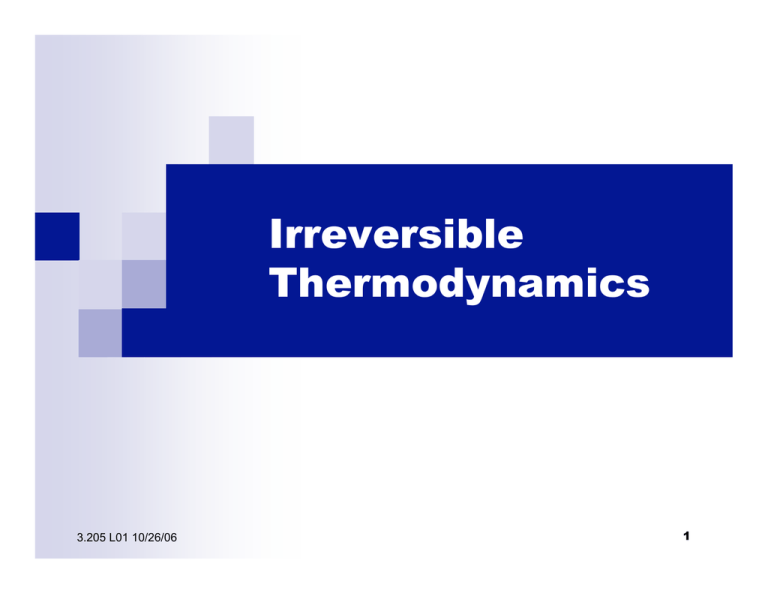
Irreversible Thermodynamics 3.205 L01 10/26/06 1 Thermodynamics and Kinetics • • • Thermodynamics is precise about what cannot happen. How can thermodynamics be applied to systems that are away from equilibrium? How are concepts from thermodynamics useful for building kinetic models? 3.205 L01 10/26/06 Samuel M. Allen 2 A few math concepts • • • • Fields, scalar Fields, vector Fields, tensor Variations of scalar fields 3.205 L01 10/26/06 Samuel M. Allen 3 • Fields, scalar Values of something are specified as a function of position, r r = xiˆ + yˆj + zkˆ , and (in kinetics) time. ! r Example: composition field c(r ,t ) from a point source diffusing into a body ! 3.205 L01 10/26/06 Samuel M. Allen 4 • Fields, vector Values of a vector quantity are specified as a function of position and (in kinetics) time Example: velocity is a vector field, e.g. in a flow field r r v (r ,t ) ! 3.205 L01 10/26/06 Samuel M. Allen 5 • Fields, tensor A second-rank tensor called the stress tensor r r " ij (r ) relates force F at a point to an oriented area Aˆ at that point ! ! ! 3.205 L01 10/26/06 Samuel M. Allen 6 • Variations of scalar fields r • Stationary field, moving point r (a bug on a surface…) r r r r r c(r + v dt) = c(r ) + "c # v dt dc r r ! = "c # v dt r • Evolving field, moving point r (a bug on a surface in an earthquake…) ! 3.205 L01 10/26/06 dc r r $c = "c # v + dt $ t ! Samuel M. Allen 7 • Continuum limits Is it possible to define a local value for concentration in the limit "V # 0 ? Figures removed due to copyright restrictions. See Figures 1.5 and 1.6 in Balluffi, Robert W., Samuel M. Allen, and W. Craig Carter. Kinetics of Materials. Hoboken, NJ: J. Wiley & Sons, 2005. ISBN: 0471246891. ! It is, with suitable care. 3.205 L01 10/26/06 Samuel M. Allen 8 • Fluxes r The flux vector J i represents mass flow of component i at a point per unit oriented area at that point r ! M˙ i ("A ) r lim = Ji $ nˆ "A#0 "A Example: swimming fish ! 3.205 L01 10/26/06 Samuel M. Allen 9 • Accumulation r Flow field, J (rˆ ) Rate of production in dV, "˙ i Accumulation of species i ! r "ci = #$ % Ji + &˙ i "t r " u ! For a conserved quantity like internal energy = #$ % J u ! quantity like entropy and for a non-conserved "t r "S = #$ % J S + &˙ i "t ! 3.205 L01 10/26/06 Samuel M. Allen 10 System at Equilibrium • • • • Characterized by uniform values of various “potentials” throughout the system e.g. T, P, µi Densities of conjugate extensive quantities e.g. S, V, Ni can be inhomogeneous at equilibrium S is maximized in a system at constant U q For an isolated system dS " 3.205 L01 10/26/06 T ! Samuel M. Allen 11 System away from Equilibrium • Kinetics concerns the path, mechanisms, and rates of spontaneous and driven processes. • Irreversible thermodynamics attempts to apply thermodynamics principles to systems that are not in equilibrium and to suggest principles by which they relax toward equilibrium or steady state. 3.205 L01 10/26/06 Samuel M. Allen 12 Postulate 1 • • It is generally possible to use principles of the continuum limit to define meaningful, useful, local values of various thermodynamics quantities, e.g., chemical potential µi. Useful kinetic theories can be developed by assuming a functional relationship between the rate of a process and the local departure from equilibrium (“driving force”). 3.205 L01 10/26/06 Samuel M. Allen 13 Postulate 2 • For any irreversible process the rate of entropy production is everywhere ≥ 0. r #S "˙ = + $ % J S & 0 #t • More restrictive than dStot ≥ 0 for isolated system. ! 3.205 L01 10/26/06 Samuel M. Allen 14 Postulate 3 • Assume linear coupling between fluxes J and forces X J" = L"# X# " , # = Q, q, I,..., N c J" = $ $ L"# X" X# # " • Electrical + heat conduction J q = Lqq Xq + LqQ XQ ! JQ = LQq Xq + LQQ XQ 3.205 L01 10/26/06 Direct coefficients, Lqq LQQ Coupling coefficients, LqQ LQq Samuel M. Allen 15 Postulate 4 • Onsager symmetry postulate • Lαβ= Lβα (microscopic reversibility). L"# = L#" %J q %J Q $ = %X Q %X q Similar to Maxwell’s relations in thermodynamics ! 3.205 L01 10/26/06 Samuel M. Allen 16 Force/Flux Pairs Flux Heat Charge Mass Conjugate Force r JQ r Jq r Ji ! 3.205 L01 10/26/06 r JQ = "K#T r J q = "$#% r Ji = "M i ci #µi 1 " #T T "#$ "#µi ! Empirical law Fourier Ohm Fick ! Samuel M. Allen 17 Multiple forces and fluxes Consider simultaneous flow of heat and charge r JQ = "LQQ XQ " LQq Xq r J q = "LQq XQ " Lqq Xq Compare heat flow in an electrical insulator with ! heat flow in an electrical conductor 3.205 L01 10/26/06 Samuel M. Allen 18
